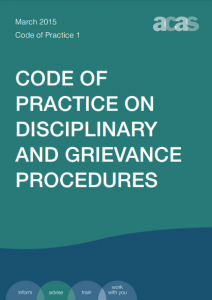A recent case has held that employers will not get into trouble with employment law if they don’t follow the Acas Code of Practice on Disciplinary and Grievance Procedures.
Mr Holmes was a security guard who was dismissed after eight years on the grounds of his ill health. He had long-term pain in pain his back, legs and hips. The employer had to accept that the dismissal was unfair – presumably acting without the assistance of employment solicitors, it hadn’t obtained a recent occupational health report. So this case was all about the amount of compensation Mr Holmes should get.
We have an article about maximising compensation in tribunal claims.
One of the parts to an unfair dismissal compensation claim is the employment law rule that if either party unreasonably fails to follow the Code of Practice, the compensation can be increased or reduced by up to a quarter. This encourages employers and employees to do everything possible to ensure a fair dismissal or avoid one entirely. For example, it provides for proper investigations, warnings and an appeal process.

The employee complained that the employer had failed to observe the employment law rule enshrined in the Code that a proper investigation should take place into the illness. To be clear, this mistake had already made the dismissal unfair. After all, Mr Holmes had had an operation that cured the pain and he shouldn’t have been dismissed. The question in employment law was whether the compensation should be increased by up to 25% or not.
The Code is called the Code on Disciplinary and Grievance Procedures. Are absence dismissals a disciplinary procedure?
The Code itself says:
- “This Code is designed to help employers, employees and their representatives deal with disciplinary and grievance situations.
- Disciplinary situations include misconduct and/or poor performance.
- This Code does not apply to redundancy dismissals or the non-renewal of fixed term contracts on their expiry.”
Absence is not in the list of things that are included and not in the list of things that are excluded. It is surprising that the matter hasn’t come up in the employment tribunals before now.
The EAT (employment appeal tribunal) decided that the Code did not apply because illness is not misconduct or poor performance. There is nothing “culpable” about being ill. Although illness can be cured, it is through the work of doctors, not the work of the employee.
Until this case employment solicitors had advised that the Code should be followed just in case. Now, there is one fewer thing to trip up HR professionals.
Case report: Holmes v QinetiQ
